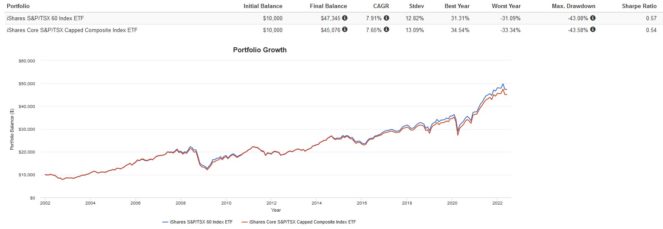Welcome to a series where I break down and compare some of the most popular exchange-traded funds (ETFs) available to Canadian investors!
Canadian investors taking a passive approach to buying domestic stocks generally default to the tried-and-true S&P/TSX, but there is a difference in indexes. Investors can pick either the S&P/TSX 60 or the S&P/TSX Capped Composite. Thankfully, BlackRock provides a set of low-cost, high-liquidity, CAD-denominated ETFs for tracking both.
The two tickers up for consideration today are iShares S&P/TSX 60 Index ETF (TSX:XIU) and iShares S&P/TSX Capped Composite Index ETF (TSX:XIC). Which one is the better option? Keep reading to find out.
XIU vs. XIC: Fees
The fee charged by an ETF is expressed as the management expense ratio (MER). This is the percentage that is deducted from the ETF’s net asset value (NAV) over time calculated on an annual basis. For example, an MER of 0.50% means that for every $10,000 invested, the ETF charges a fee of $50 annually.
XIU has an MER of 0.20% compared to XIC at 0.06% The difference here is around $14 on a $10,000 portfolio, which can add up over the long term, especially as your portfolio gets larger. The clear winner here is XIC, which is as cheap as it gets in the Canadian ETF industry.
XIU vs. XIC: Size
The size of an ETF is very important. Funds with small assets under management (AUM) may have poor liquidity, low trading volume, high bid-ask spreads, and more risk of being delisted due to lack of interest.
XIU currently has AUM of $13 billion, whereas XIC has AUM of $10 billion. Although both are more than sufficient for a buy-and-hold investor, XIU is clearly the more popular one. This is no surprise given that XIU is the oldest ETF listed on the Canadian market!
XIU vs. XIC: Holdings
XIU tracks the performance of a market cap-weighted index of the 60 largest stocks trading on the Toronto Stock Exchange (TSX) net of expenses. This makes it an excellent barometre for Canadian blue-chip stock performance. If you’re bullish on large caps, particularly energy and banking sector stocks, XIU could be a good pick.
However, the Canadian market doesn’t end at just 60 companies. What XIU does not include is the +100 small- and mid-cap stocks that make up the remainder of the market. These stocks are riskier but have higher potential for growth. Investing in XIC is the way to capture them, as the ETF holds 240 large-, mid- and small-cap stocks, with its top 10 holdings the same as XIU.
XIC is still concentrated in the financials and energy sectors, but there is a more balanced allocation to other sectors, such as materials, industrials, technology, utilities, and telecoms as a result of the small and mid-caps. The proportion of small and mid-caps is still small, but does introduce additional volatility, so be prepared for slightly higher risk if you choose XIC.
XIU vs. XIC: Historical performance
A cautionary statement before we dive in: past performance is no guarantee of future results, which can and will vary. The portfolio returns presented below are hypothetical and backtested. The returns do not reflect trading costs, transaction fees, or taxes, which can cause drag.
Here are the trailing returns from 2002 to present:

Here are the annual returns from 2002 to present:

XIU has outperformed over the last decade. I chalk this up to the excellent performance of Canadian large-cap stocks, in particular those from the banking sub-sector. Over time, I expect these differences to narrow, particularly if mid- and small caps make a resurgence.
The Foolish takeaway
My pick is for lower fees and broader diversification. For that reason, XIC is my choice for investing in Canadian domestic stocks. That being said, if you prefer the liquidity and large-cap focus of the S&P/TSX 60, XIU is a great pick as well.







